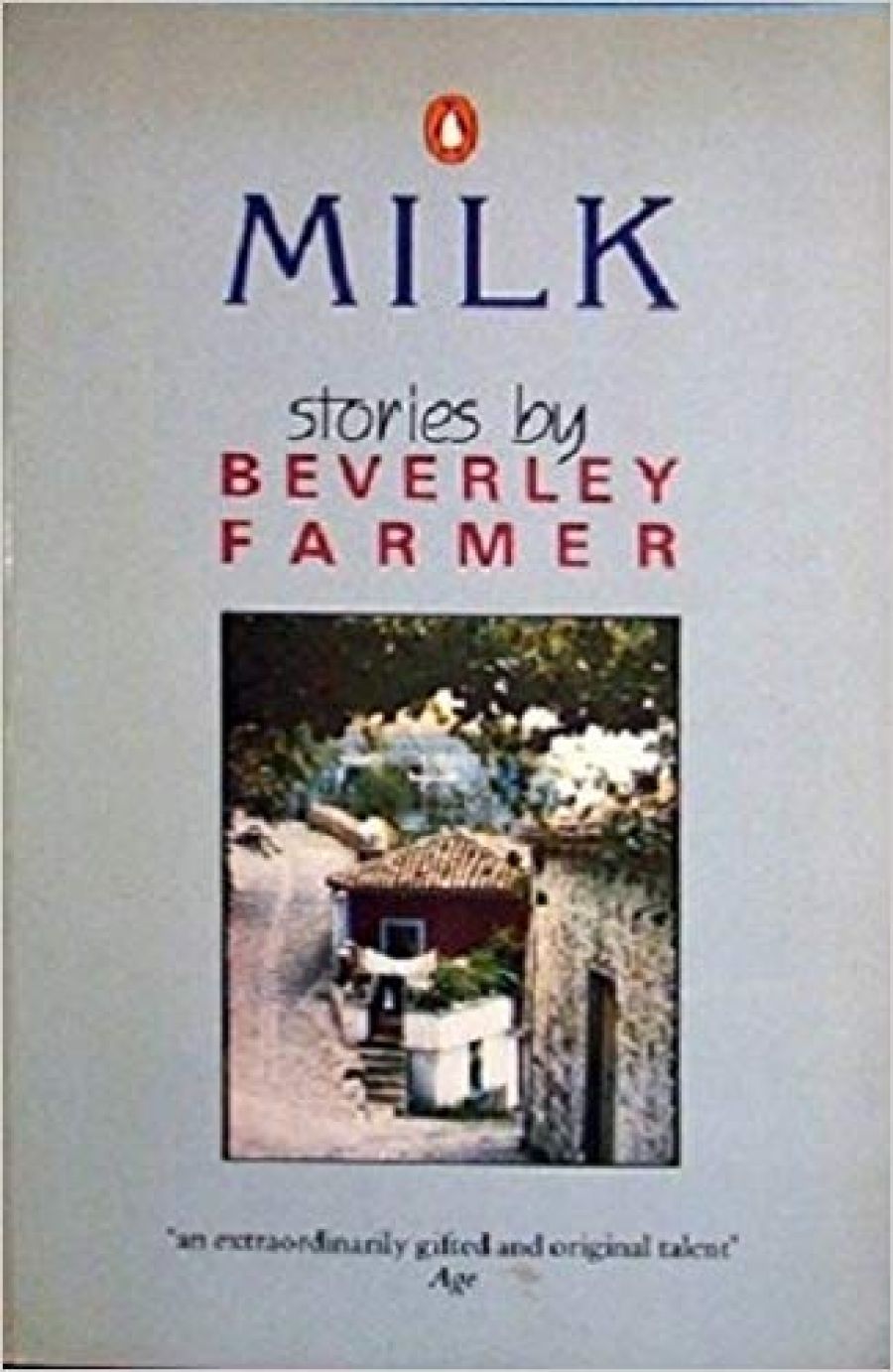
- Free Article: No
- Contents Category: Fiction
- Review Article: Yes
- Online Only: No
- Custom Highlight Text:
Greek and English, the Greek father and Australian mother, the child in the middle who looks at one object and sees different creatures – no catch-phrase like ‘culture conflict’ says much about what is happening in Ismini’s life at this moment. The story does, however, in the strong, unblinkered prose of Beverley Farmer as she writes with unfaltering sensitivity about Greece, about Australians in Greece and Greeks in Australia, and, painfully, about couples and the families who mix their cultures with their love and hate.
- Book 1 Title: Milk
- Book 1 Biblio: McPhee Gribble/Penguin, 178 pp, $6.95 pb, 0 14 00 7184 9
Greek and English, the Greek father and Australian mother, the child in the middle who looks at one object and sees different creatures – no catch-phrase like ‘culture conflict’ says much about what is happening in Ismini’s life at this moment. The story does, however, in the strong, unblinkered prose of Beverley Farmer as she writes with unfaltering sensitivity about Greece, about Australians in Greece and Greeks in Australia, and, painfully, about couples and the families who mix their cultures with their love and hate.
The stories in Milk, written to no formula, disregard the current fashion of generalising about so-called multicultural experience. The social insight is there, nonetheless. Farmer lived for three years in Greece and, from that experience, seems to have an unusually keen awareness of just how a society – any society – puts pressure on people to behave and feel in certain ways.
In the title story of the collection, ‘Milk’, a nine-year-old Australian boy visits his grandparents in Greece for the first time and is entranced with the villagers until he has to confront the practical turn of mind which leads people to tie their donkeys on the other side of the river during winter when it snows and the wolves and foxes come down from the dark mountains to kill the stranded animals. To the boy’s agonised ‘Why?’, the grandmother replies with matters of fact: ‘What use was a donkey in winter? There’s no room, no feed. They say it’s cheaper to buy a new one in spring.’
The boy is shocked and cannot understand such ways. When the next-door neighbour’s donkey, shrieking with pain, gives birth and is left to die, the boy resists village conventions and keeps alive the baby by feeding it cow’s milk from bottles.
In the background behind this battle for the donkey’s life, the child is dimly aware of an old woman dying, and of the bitter convention imposed by some barely remembered family quarrel which now forbids his grandmother from consoling the friend of her girlhood with love and yoghurt. The grandmother in her grief ‘gave up’, and although the little boy with his eyes fixed on the baby donkey sees her retreat from life simply in terms of what happens to the milking of the cow, the background drama is vividly present for the reader. This story, like the others in the collection, is so well written that the narrator’s perspective is only one of the ways offered for understanding things.
The multiple perspectives in the stories leave an eerie sense of isolation, suggesting as they do that important truths are known in solitude. People may share experiences without sharing perspectives, sharing a sense of what matters and is centrally true. In their solitude, the characters seem fragile, their lives a precarious collection of images, memories, feelings – all unsupported by the outside world.
Nothing is stable or permanent. In ‘Saint Kay’s Day’, an Australian woman in love with her sole pupil of English in Thessaloniki, suddenly sees into the heart of things:
She was hanging out a wet sheet in the wind when it became a sail, and a woman – who? – on a shore somewhere was leaning forward to tell her reproachfully, ‘Life is so ephemeral.’ The word itself was like a puff of air: ephemeral. It stayed with her. She even looked it up in Greek: efimero, the same. Life was efimero.
All of the stories in Milk seem troubled by this vision, including the very fine stories that do not take Greece for their subject.
As a form within fiction, the short story suits such a vision perfectly, just as the lyric does within poetry, and Beverley Farmer has a masterful control of the form. There is a range of subject, a range of tone and feeling, in this unusually well-balanced and even collection. Many of the stories have been published before; several have won awards. Milk represents the impressive achievement of a gifted and disciplined writer.


Comments powered by CComment